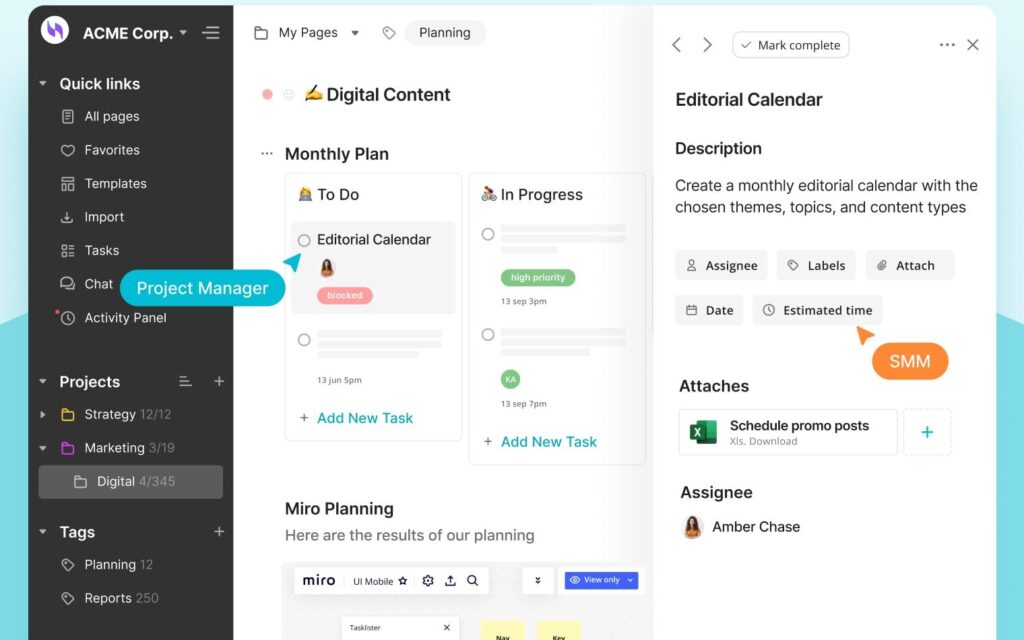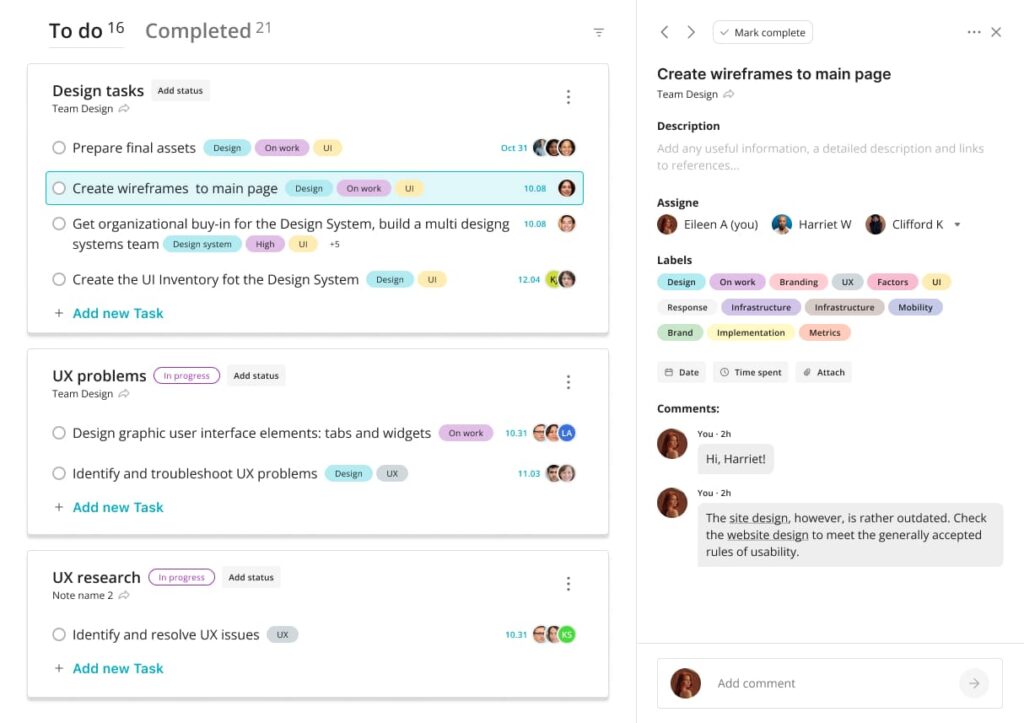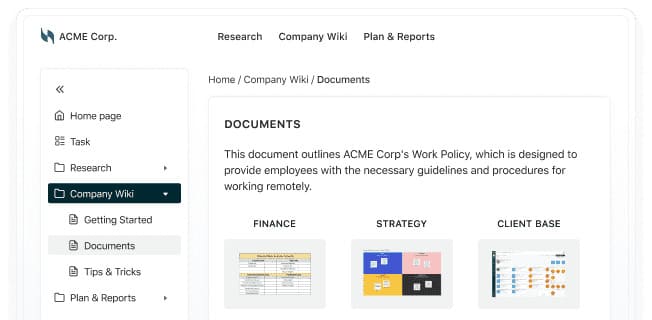
In a busy world, having to deliver consistent results can be exasperating. You have to keep yourself active and productive to achieve your desired goals, but it can be challenging considering all the distractions. According to Atlassian, an average individual spends 31 hours attending unproductive meetings that leave very little time to reach target goals.
Microsoft conducted a survey that showed people work 45 hours a week, but out of that, 17 hours are unproductive. The remaining period might not be sufficient for people to achieve their goals. Considering all this unproductivity, people can find it arduous to get their work done.
In this article, we have gathered the best productivity tips that we hope will help you always stay efficient and productive at work. However, before trying to increase your productivity, let’s dive into the essence of productivity itself.
What is workplace productivity?
When speaking about workplace productivity, we primarily mean how much work is completed in a specific working environment, over a specific amount of time. Productivity should, in theory, be maximized when a company, an organization, or an individual is operating at capacity.
Now that the world is adapting to living and working in normal conditions again, improving work productivity and regaining work-life balance are the two challenges employees are facing most acutely. Employers struggled with employee productivity management during the Covid19 pandemic, and now they are struggling to make their teams become more productive while adjusting to a hybrid work model.
Workplace productivity is also understood as the efficiency, with which tasks and goals are completed at a given company. Interestingly, productivity at work doesn’t depend on the time spent in the office or the length of the working week.
Why workplace productivity matters
It is difficult to overestimate productivity, which is often described in terms of efficiency and output. Productive teams utilize the capacity of the human resources they have to the full extent. Productive employees, in their turn, stay focused on the right things at the right time. The sign that your company is productive is quite simple and straightforward: important tasks are getting done and maybe even they are getting done in less time than before. And not just tasks. You’re achieving your most important goals.
Customer benefit
Productivity at the workplace often translates into excellent customer interaction and service. Satisfied customers return and in the long term become loyal ones. Any business strives to support a complete customer experience, productive businesses cope with the task better. Customer satisfaction is a key component of a successful organization.
Advantages for staff
When a company becomes productive, it eventually succeeds, and the workforce undoubtedly receive perks as a result. These could include pay increases, bonuses, health insurance, and other benefits. As a result, employees’ work-life balance improves. More than that, the business growth gives its employees new job opportunities and inspires them.
Pluses for companies
Employees can be considered as an investment, and like any investment, they should provide the business with a positive or worthwhile return. As a result, when employees are highly productive, the business meets its objectives for initially investing in them. Productivity also contributes to a more positive workplace environment by energizing employees and raising morale.
How to increase your work productivity – 16 tips
Getting our job done on a set schedule can be very satisfying. Maintaining productivity can be challenging, but it’s not impossible. We have some helpful tips you can use to build a positive mindset that will help you work productively for effective results.
Tip 1: Fill the tank — recharge
Energy has as much importance as productive time. Refresh tweets. Productivity techniques are effective ways to increase productivity. But they are not advisable when you don’t care about yourself. High-quality workers are spending their energy recharging. Ideally, this means a proper sleep routine and exercise throughout the day. When it is difficult for people in their own lives to think clearly and focus on things they do not understand it is important to check their daily habits. Sleeping. Exercises. Take care of yourself.
Tip 2: Don’t multitask
No Multitasking! With our environment cluttered with distractions, it is tempting to fall into multitasking traps. No. Multitasking studies show that people have problems doing them. It’s a misconception that “multitasking” can be wrongly named. When one does a task in one place, the other one quickly switches between the two tasks. Every time someone switches you must regain focus. Since you need to work quickly and learn quickly, this “shifting cost” makes multitasking not so efficient. Those, who tend to focus on one task at a time are much harder to distract – for example, by messengers or social media notifications. The efficiency of multitasking is overpriced for sure.
Tip 3: Take breaks
A brief break during the hour would be ideal. Breaks lasting a couple of minutes can recharge a person’s energy and give new thoughts. Make sure to take a break. Computers and machines might be able to work constantly, but humans are biological creatures. We are not designed to do tasks constantly for long periods. Taking breaks in between tasks can help you stay refreshed as you complete your work.
Tip 4: Prioritize your most important tasks
Prioritizing means deciding on the order tasks should be done based on their importance. Establishing priorities is necessary to be able to complete all the things that need to be done. Prioritization allows concentrating attention on the more important and urgent tasks so that you can later focus on lower-priority tasks. This way, you can get more done with less effort.
Tip 5: Take the initiative and start work
According to the Zeigarnik Effect, humans are compelled to finish a job once they start something. You can use this to your advantage by simply taking the first step and starting your work. It’s common for people to delay tasks because of fear (of not getting the job done or not completing it to high standards). This can lead to procrastination and passing the time by working aimlessly on smaller tasks that are less important. When you have a bigger project, just start working on it. Once you get into a rhythm, it can be easier to see it to completion.
You can also make daunting tasks easier by breaking them into manageable chunks. Once you conquer a small part of a project, you might feel motivated to tackle the next part.
Tip 6: Wake up early
Take a look at all top leaders who have a common characteristic: they start early. Sometimes it is the sleeping schedule that defines why some people go jogging every morning and are more productive at work, while others oversleep and procrastinate.
Tip 7: Make fewer decisions (about things that aren’t important)
Take fewer decisions. Try automating a few key decisions and not thinking about them. As President Barack Obama told magazine Vanity Fair, he never decided on which suit to wear. If it’s your goal to increase productivity, outsource or eliminate the usual tasks. Other productive individuals make similar remarks about their efficiency habits too.
Tip 8: Watch what you eat
Eat healthy foods throughout the day to avoid energy crashes and keep your brain properly fueled. Our eating habits can influence the productivity of our brains as it helps increase our mental capacity and thus productivity. Junk food can cause you to be overweight. Keep healthy snacks in your office so you can get energized for an efficient day of work.
Tip 9: Break tasks into smaller pieces
What are the reasons behind procrastinating? People can procrastinate a lot because their to-do lists seem daunting to some people. When a task is deemed important but not very specific, this is a tough task to tackle. When you look at this thing, you wonder “where are you supposed to go?”. Start with breaking big to-dos into smaller to-dos. Set some goals for completing the task. In this context, it is important to mention the two-minute rule, which has proved to be extremely efficient.
First formulated by David Allen in his book, Getting Things Done, the two-minute rule aims to defeat procrastination. This is what it says: if you can accomplish a task in two minutes or less, do it at the moment — and don’t delay.
Tip 10: Listen to music
Having headphones does nothing to make a person antisocial. During work, listening to your favorite songs helps you get to a place where your priorities are and eliminates your to-do list. Despite the fact that music can aid people in the flow state, this may be distracting for some.
Tip 11: Get out of the office
Remote work may improve productivity and get things done quickly. While the workplace provides energy for a community, it can affect the productivity of our workforce. A study from the Harvard Business Review found that people working at home were more productive.
Tip 12: Add color or live plants
Color can significantly affect your mood and productivity at the end of the day. Blue can provide calmness and can help concentrate, while red can be perfect at work where precision and detail are required. Plants are able to help focus, according to a new study, those working in the workplace who are physically and mentally active report being less stressed and productive. Decorate your workspace Decorating the workplace or office with personal knickknacks can give a relaxed feeling and improve efficiency.
Tip 13: Put your phone on silent mode
Restrict distractions by avoiding your cell phone, deleting chat, and shutting your email in case there are unforeseen issues before starting the work. Write down your daily goals It is sometimes difficult to track the things to accomplish and so begin each day with putting out your daily goals.
Tip 14: Move around
Exercise has measurable effects on health and productivity as well as productivity at work. Physical exercise is associated with better mental focus. Try running in the morning, or doing some exercise. You can also do some exercises during breaks. The body releases BDNF (Brain-Derived Neurotrophic Factor) in response to exercise and it plays a role in your reset switch. It helps you feel easy and calm after exercise. Exercising helps influence the hippocampus region of the brain, which deals with learning and memory. Exercising also releases endorphins that boost mood, helping you gain the right mindset for effective results.
Tip 15: Include meditation in your daily ritual
We need food to survive. Similarly, our mind also needs food. Meditation nourishes the mind. Including it in your routine daily can increase working performance. Meditation helps us replace our negative emotions with positive ones. It causes structural changes to the part of the brain that results in increased emotional and cognitive processing. Mediation helps improve both physical and mental health.
Meditation changes the cortical thickness, thus resulting in increased gray matter. This change helps in sharpening memory and decision-making skills. You can clear your thoughts, reduce stress and focus better by meditating. Moreover, it also builds a strong connection between DMN regions that help you quickly shift to a focus state. So it’s worth setting aside a time slot each day – it shouldn’t be more than 15 minutes, better in the morning – just to let your brain relax.
Tip 16: Make use of specialized solutions

Do not underestimate the importance of the time-management and collaboration tools for business. There are lots of online apps, software programs, and even platforms that could help businesses and their employees streamline the workflow, and thus increase work productivity. One of the best tools for increasing productivity at the workplace is FuseBase . It is a universal, all-in-one collaboration solution ideal for remote teams. FuseBase provides an integrated set of productivity tools that can be easily tailored to the needs of the specific company or business.
Common workplace productivity challenges
In today’s time, there are more distractions than ever. People need to work harder to overcome the tempting urge to check Instagram posts or new tweets from their favorite celebrities. We are often prone to switching tasks when we have more than one thing to do, leading to very little work being done. In some cases, the culprit of lack of productivity is not the Internet or our colleagues who chat about their exciting stories but our habits that make us prone to distraction. Working on computers or laptops makes it easy to shift to distracting websites or games that leave us sidetracked from work. To overcome this, we have a life-saving hack for you. Separate your work into workspaces: one for play and one for important tasks; in this way, you can help overcome the distraction problem. After finishing your work, you can reward yourself by playing your favorite game or watching your favorite series.
Stress
The brain is powerful, and if we use it right, we can have the right mindset to achieve our goals in less time with increased work productivity. Our mindset is influenced by our thoughts. So, to increase work productivity, we should focus on building the right habits and thoughts. We should aim to feed our brain with positive behavior and thoughts, so we don’t put unnecessary stress on it.
Our brain is designed to function specifically in response to different bodily states. In the state of stress, when our heart rate increases, the brain produces cortisol to handle the fight or flight response. If stress is prolonged because of extensive pressure or multitasking, this can cause cortisol levels to rise.
In a state of constant stress, it might be hard to focus on a single task. When you’re overloaded with distractions and juggling tasks, it might be difficult to effectively tackle your work and get things done.
Stress affects people differently – what stresses one person may not affect another. Factors like skills and experience, age, or disability may all affect whether a worker can cope. Managers should help staff with stress management and constantly work on improving communication and motivation.
Time management

When you’re settling into a new job and getting used to your new duties, it might be challenging. Make a list of your daily tasks or objectives. By breaking down your tasks, you will remain organized, your “to-do” list will look more doable, and this will increase your output and efficiency. If you are still having trouble managing your tasks, get assistance from a coworker or talk to your supervisor about setting priorities for your workload.
Excessive Meetings
Today’s workplace is full of distractions: chatting employees, coffee machine noise, social media notifications popping up, etc. However, nothing distracts more than unnecessary meetings. There are days when your schedule is packed with calls leaving short breaks in between which are not long enough to get back to work. And in the end of the day, you realize that you actually didn’t have time to complete your tasks and feel demoralized. Sounds familiar, right? Excessive meetings drain employees, destroy their morale and motivation.
Ineffective communication
Poor communication between employees may cause them to make wrong assumptions resulting in tensions that can lead to full-scale conflicts. Failure to establish effective communication at the workplace can be frustrating to employees, feelings of hostility, angst, and spite. Building effective communication at work required not only perfect interpersonal skills but also advanced collaboration tools. Quite often, managers focus on one short-term goal failing to see the importance of creating long-term communications development plans. When speaking of establishing effective communication channels within a team or even a corporation, one should also stress the value the dedicated solutions could bring. Best communication and collaboration tools embrace not only messengers but also intranet, knowledge base, client portal, corporate social media solution, etc.
How do you show productivity at work?
As we have already mentioned, workplace productivity can be resolved to how much “work” is completed over a given period of time. Depending on the type of the business, the “work done” can refer to new clients gained, phone calls made, and, of course, sales generated. A company’s primary objective should be to increase productivity without compromising the quality of its products or the use of its resources.
How workplace productivity can be calculated? Basically, it can be measured by how rapidly and effectively a team can generate goods and services during a specific time period. It’s a crucial indicator economists employ to gauge productivity.
However, it should not be confused with employee productivity, which assesses how much work a person can complete in a given amount of time. In terms of statistics, tracking the effectiveness of a bigger group is more precise than doing so for a single individual.
That does not mean, though, productivity in the workplace comes down exclusively to the office workers. It applies to those who work remotely as well. They may also find these productivity tips useful and enlightening.
What is an example of productivity in the workplace?
Productivity always comes down to the correlation between output and the amount of time spent to achieve that output. To simplify further, we can say that the formula of productivity is output divided by input.
When the team is productive, it takes less time, effort, and human resources to create a high-quality product. When the quality of the output stays the same, but it takes less input to accomplish it, congratulations, you are working efficiently and becoming more productive.
Higher workforce productivity means that staff is more productive, and more things get done during a specific period of time. As a result, businesses make more money since they pay for fewer employees’ wages to produce the same number of units of commodities or dollars in sales.
How to get more done: 5 habits of highly productive people
Let’s walk through the habits that allow efficient people to cope with challenges like procrastination, boring tasks that need to be done, having to respond to tons of emails, and possible workplace distractions. What exactly helps them stay motivated and focused on important tasks?
Take small steps
Start your mornings with cleaning out your desk, shaping a day plan, and decomposing bigger tasks into small ones. The bigger the project is, the more people tend to procrastinate. That’s the reason why why the most effective workers break huge jobs down into small, achievable steps.
Eat the frog first
Force yourself to do the most difficult or frustrating task first in the morning. This way you won’t be dawdling and trying to postpone the unpleasant task.
Reward yourself
One of the most crucial habits of productive people is rewarding themselves as they achieve important goals, this creates a positive mental cycle and helps make things a little more doable.
Learn to say NO
Of course, saying ‘No’ at work can be pretty much uncomfortable but saying ‘Yes’ to everything is not healthy either. Being able to say ‘No’ when needed, you would have more time to focus on priority tasks.
Love what you do
Any productivity tips and tricks in the world won’t help if you do not like your job. The most productive people are those who feel passionate about what they do and are genuinely motivated to succeed.
The Bottom Line
If you want to build a productive mindset, do not pressure yourself. Set your goals, take small breaks, and try to change old bad habits slowly instead of trying to eliminate them instantly. FuseBase can help you control these processes.

Use FuseBase templates for a day’s planning or create project management dashboards that suit your needs from scratch. It will help you immensely in increasing your productivity and building the right headspace for tackling your goals.
For more articles and updates, join FuseBase on Facebook!
Found it useful? Share the article with your community
Subscribe to our blog!
Get weekly tips and insights on how to grow your business